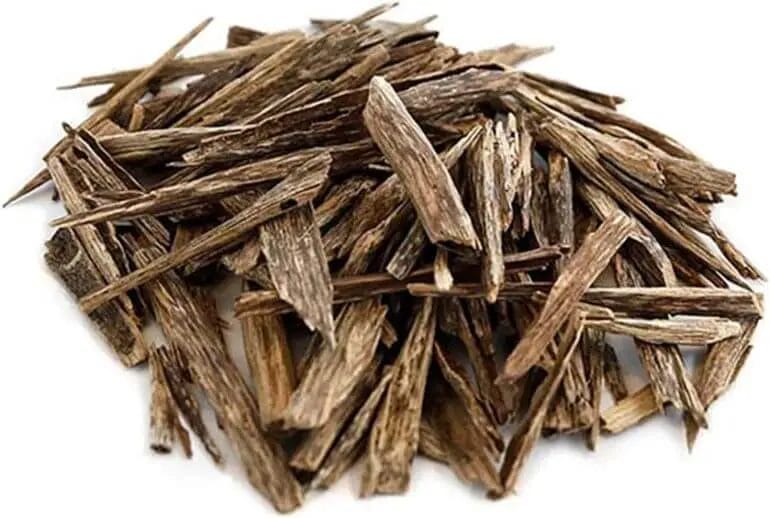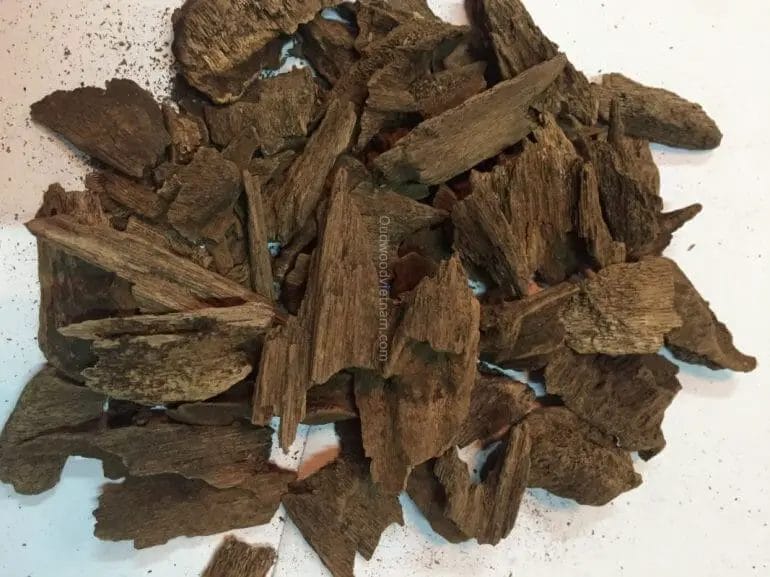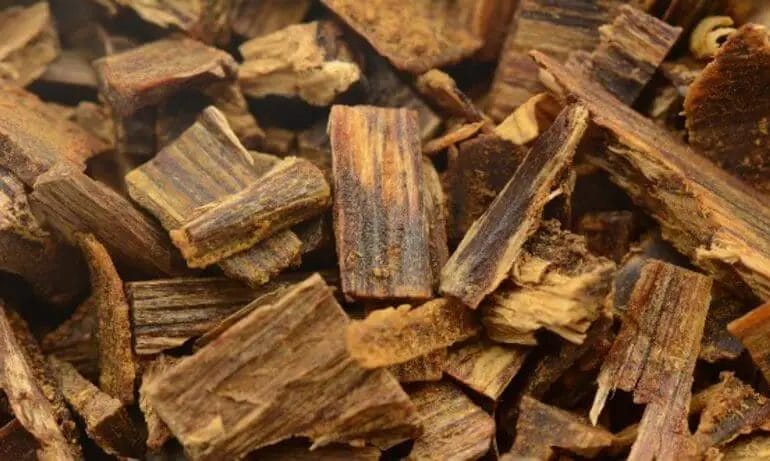Oud wood, also known as agarwood, is a highly prized and rare resinous wood that has been used for centuries in traditional perfumes and incense. Derived from the Aquilaria tree, this aromatic wood possesses a unique and captivating fragrance profile, often described as woody, smoky, and rich.
Renowned for its luxurious and exotic appeal, oud wood has become increasingly popular in the world of perfumery, known for its longevity and depth. With its complex and alluring scent, oud wood has become a sought-after ingredient in high-end fragrances, adding a touch of opulence and sensuality.

As a result of its rarity and the meticulous process of extraction, oud wood is considered a luxury ingredient and is highly valued by perfumers and fragrance enthusiasts. Its distinct aroma has captivated the senses of many, making it a timeless and distinctive fragrance note that stands out in the world of perfumery.
Whether used as a standalone scent or combined with other complementary notes, oud wood brings a touch of elegance and sophistication to fragrances, creating a mesmerizing olfactory experience that lingers on the skin and leaves a lasting impression.

Exploring the Origins of Oud Wood
Oud wood, also known as agarwood, is a highly prized and sought-after material in the world of fragrance. Its rich, woody aroma has captivated perfumers and enthusiasts for centuries. But what exactly is oud wood and where does it come from? In this section, we will delve into the origins of oud wood and understand its journey from tree to perfume.
The oud tree, scientifically known as Aquilaria, is native to the forests of Southeast Asia, including countries such as India, Cambodia, Vietnam, and Malaysia. These trees are typically found in tropical and subtropical regions, where the climate supports their growth. Oud wood is a resinous substance that forms within the heartwood of the agarwood tree when it becomes infected with a specific type of mold. This infection triggers a natural defense mechanism in the tree, causing it to produce the resin, which eventually hardens and becomes oud wood.
Harvesting oud wood is a meticulous process that requires the utmost care and expertise. Traditionally, the trees were left to grow for several decades until they reached maturity and naturally became infected. However, due to the high demand for oud wood, unsustainable practices such as illegal poaching and overharvesting have become prevalent, leading to the endangerment of the agarwood tree species.
To combat this issue and promote sustainability, some countries have implemented regulations and sustainable farming practices. For example, in Thailand, the government has established agarwood plantations, where trees are cultivated in a controlled environment. This ensures a sustainable supply of oud wood while protecting natural forests. Similar initiatives have been undertaken in other countries as well to preserve the agarwood tree species.
Once the oud wood has been harvested, it undergoes a process of steam distillation or solvent extraction to extract the fragrant compounds. The resulting liquid is then aged for a period of time to develop its unique aroma. The scent of oud wood is often described as earthy, woody, and slightly sweet, with hints of leather and spice. It is known for its longevity and complexity, making it a prized ingredient in the world of perfumery.
Oud wood has a rich historical and cultural significance in many regions. It has been used for centuries in traditional medicine and religious ceremonies. In the Middle East, oud wood holds a special place and is often burned as incense during important occasions and celebrations. Its unique scent is believed to have spiritual and therapeutic properties, bringing a sense of calm and tranquility.
In summary, oud wood is a precious and rare material that originates from the agarwood tree found in the forests of Southeast Asia. Through sustainable farming practices, the oud wood industry aims to protect the agarwood tree species while ensuring a continuous supply of this highly valued fragrance ingredient. Its unique aroma and historical significance make oud wood a prized and cherished ingredient in the world of perfumery.

Unlocking the Secrets of Oud Wood’s Scent
Oud wood, also known as agarwood, is one of the most fascinating and sought-after scents in the world of perfumery. Its rich and complex aroma has captivated people for centuries, and its rarity and exclusivity make it highly coveted. In this section, we will delve into the secrets behind oud wood’s scent and explore why it is so unique and alluring.
The Origins of Oud Wood
Oud wood comes from the Aquilaria tree, which is native to Southeast Asia. When the tree undergoes a natural process of infection or injury, it produces a resinous substance as a defense mechanism. This resin gradually transforms into agarwood, the precious material that is used to extract oud oil.
The formation of agarwood can take several years, and not all Aquilaria trees will produce it. This rarity contributes to the exclusivity of oud wood and its high value. Harvesting oud wood requires careful extraction methods to ensure the preservation of its unique aromatic qualities.
The Aroma of Oud Wood
Oud wood possesses a distinctive and multifaceted scent that is difficult to describe in words. It is often described as woody, smoky, and earthy with hints of sweetness and spice. This complexity arises from the presence of various volatile compounds in the oud oil.
One of the key components responsible for oud wood’s captivating aroma is a compound called agarospirol. This compound is responsible for the rich and resinous scent that oud wood is renowned for. Additionally, other compounds such as sesquiterpenes and phenols contribute to the overall scent profile of oud wood.
The Allure of Oud Wood
What makes oud wood so alluring and desirable? Its unique scent has a certain mystical and luxurious quality that sets it apart from other fragrances. Oud wood has a deep, lingering aroma that evolves over time, creating a captivating olfactory experience.
Moreover, oud wood has cultural and historical significance. It has been used in traditional medicinal practices and spiritual rituals in various cultures for centuries. Its association with luxury and opulence reinforces its allure in the world of perfumery.
Exploring Oud Wood in Perfumery
Oud wood is a prized ingredient in the world of perfumery, where it is used to create luxurious and complex fragrances. Perfumers often combine oud wood with other complementary notes to enhance its unique qualities.
The versatility of oud wood allows it to be incorporated into a wide range of fragrance compositions. It can add depth and character to floral, woody, or oriental perfumes, creating a captivating blend that is both timeless and modern.
In Summary
Oud wood’s scent is a testament to nature’s artistry and the skilled craftsmanship of perfumers. Its rarity, complexity, and cultural significance make it a truly captivating fragrance. Whether used as a standalone note or as part of a complex composition, oud wood continues to enchant and intrigue fragrance enthusiasts around the world.

4. The Allure of Oud Wood: A Sensory Experience
Oud wood has captivated the senses of many for centuries with its unique and enchanting aroma. In this section, we will explore the allure of oud wood and its compelling sensory experience.
Oud wood, also known as agarwood, is derived from the resinous heartwood of the aquilaria tree. This rare and precious wood is renowned for its deep, rich fragrance that is often described as woody, smoky, and musky. The aromatic properties of oud wood are so distinct that it has become a prized ingredient in the world of perfumery.
The allure of oud wood lies not only in its captivating scent but also in its rich cultural and historical significance. Oud has been used for centuries in various cultures for its medicinal and spiritual properties. In many Eastern traditions, oud wood is believed to have therapeutic effects, promoting relaxation and a sense of tranquility.
When experiencing oud wood, one is immediately transported to a world of sensory delights. The fragrance of oud wood is complex and multi-faceted, evolving over time to reveal different layers of aroma. It starts with a warm, inviting scent that gradually deepens into a hypnotic blend of earthy and smoky notes.
The unique olfactory profile of oud wood makes it a sought-after ingredient in luxury fragrances. Perfume connoisseurs and enthusiasts are drawn to the depth and complexity that oud wood brings to a composition. The aroma of oud wood has a remarkable staying power, lingering on the skin for hours and leaving a lasting impression.
Besides its aromatic allure, oud wood also has a tactile appeal. The wood itself is dense, dark, and beautifully grained, adding a touch of opulence and sophistication. Its smooth and velvety texture make it a pleasure to handle and touch, further enhancing the sensory experience.
The Sensory Journey of Oud Wood
Exploring the allure of oud wood is a sensory journey like no other. It begins with the visual allure of the wood itself, with its dark and luxurious appearance. As you hold a piece of oud wood in your hands, you can feel the weight and solidity of the wood, connecting you to its origins in nature.
The next stage of the sensory experience comes with the aroma of oud wood. As you inhale its intoxicating scent, you are transported to a world of mystery and intrigue. The fragrance envelops your senses, evoking a sense of timelessness and exoticism.
As the aroma unfolds, you start to notice the intricate layers of oud wood’s fragrance. The initial notes may be woody and resinous, reminiscent of a forest after the rain. These notes gradually give way to smoky and leathery undertones, adding depth and complexity to the olfactory journey.
The final stage of the sensory experience is the tactile pleasure of oud wood. Running your fingers over the smooth surface of the wood, you can feel its warmth and texture. The touch of oud wood is comforting and grounding, creating a sense of connection to the natural world.
Unlocking the Allure of Oud Wood
To fully experience the allure of oud wood, one must immerse themselves in its sensory delights. Here are some ways to unlock the enchantment of oud wood:
- Exploring Oud Perfumes: Discover the world of oud-based perfumes and colognes. Experience the different compositions and variations of oud wood in fragrance form.
- Creating a Scented Atmosphere: Burn oud wood incense or use oud-scented candles to fill your space with the captivating aroma of oud wood.
- Investing in Oud Accessories: Consider adding oud wood accessories to your collection, such as oud wood bracelets or pendants, to carry the aroma with you wherever you go.
- Embracing Oud in Skincare: Explore skincare products infused with oud wood extracts for a sensory experience that extends beyond fragrance.
The allure of oud wood is an invitation to indulge in the sensory pleasures it offers. Whether through its captivating aroma, tactile appeal, or cultural significance, oud wood has the power to transport us to a world of sensory enchantment. Embrace the allure of oud wood and let it awaken your senses.
Oud Wood in Perfumery: Unveiling its Timeless Charm
Oud wood, also known as agarwood, is a precious and highly sought-after ingredient in the world of perfumery. This aromatic resin is derived from the heartwood of the Aquilaria tree, which is native to Southeast Asia. With its rich and distinctive scent, oud wood has captured the attention of perfumers and fragrance enthusiasts alike.
The allure of oud wood lies in its complex and captivating aroma. It is often described as woody, smoky, and leathery, with hints of sweetness and spice. The scent of oud wood is deep, mysterious, and has a certain timeless charm that sets it apart from other fragrance notes.
The Origins of Oud Wood
The history of oud wood dates back centuries. The Aquilaria tree, from which oud wood is derived, is native to countries such as India, Bangladesh, and Indonesia. The process of producing oud wood involves the resinous heartwood of the tree being infected with a specific type of mold, which triggers the formation of agarwood and gives it its unique fragrance.
In ancient times, oud wood was highly prized and considered a luxury ingredient. It was used in religious ceremonies, as well as for its medicinal properties. Over time, oud wood found its way into the world of perfumery, where its allure and distinctive scent continue to captivate fragrance lovers.
The Timeless Appeal of Oud Wood
One of the reasons oud wood has stood the test of time in the world of perfumery is its versatility. It blends beautifully with a wide range of other fragrance notes, adding depth and complexity to perfumes. Oud wood can be both a strong and dominant note or a subtle and supporting element, depending on how it is used.
Furthermore, oud wood appeals to both men and women, making it a popular choice in unisex fragrances. Its deep and intoxicating scent is often associated with luxury, sophistication, and elegance.
Exploring Oud Wood Perfumes
The market is filled with a diverse range of oud wood perfumes, each offering its own interpretation of this timeless ingredient. Some perfumes highlight the woody and smoky facets of oud wood, while others accentuate its sweet and spicy nuances.
Popular oud wood perfumes for men include ‘Tom Ford Oud Wood,’ which combines oud wood with notes of rosewood, cardamom, and amber, creating a warm and inviting fragrance. ‘Montale Black Aoud’ is another popular choice, featuring oud wood paired with rose, patchouli, and leather notes.
For women, ‘Jo Malone Oud & Bergamot’ is a classic scent that combines the richness of oud wood with the freshness of bergamot. ‘By Kilian Rose Oud’ is a luxurious fragrance that combines oud wood with rose, creating a beautiful and elegant scent.
The Timelessness of Oud Wood
Despite the ever-changing trends in the perfume industry, oud wood remains a timeless and coveted ingredient. Its unique and captivating scent continues to intrigue and fascinate fragrance enthusiasts across the globe.
Whether used as a standalone note or blended with other ingredients, oud wood adds a touch of luxury and sophistication to any perfume. Its complexity and depth make it a staple in the world of perfumery, ensuring its enduring appeal for years to come.
In summary, oud wood is a timeless and enchanting ingredient in the world of perfumery. Its complex and captivating aroma, versatility, and association with luxury make it a sought-after choice for both men and women. With its deep and mysterious scent, oud wood adds a touch of sophistication to any fragrance. Explore the world of oud wood perfumes and experience the timeless charm of this exquisite ingredient.
FAQs
What is Oud Wood?
Oud Wood is a highly prized fragrance ingredient derived from the resinous wood of the Aquilaria tree. It is known for its rich, woody, and exotic scent, often described as earthy, smoky, and slightly sweet. Oud Wood is commonly used in perfumery and is a popular note in luxury fragrances and colognes.
Conclusion:
In conclusion, Oud Wood is a truly exquisite fragrance that captures the essence of luxury and sophistication. Its unique blend of rare oud wood, spices, and exotic notes creates an intoxicating and long-lasting scent that is sure to leave a lasting impression. Whether you’re looking to make a statement or simply want to indulge in a luxurious sensory experience, Oud Wood is the perfect choice.
With its increasing popularity, Oud Wood has become a sought-after fragrance in the perfume industry. Its rich and complex aroma appeals to both men and women, making it a versatile choice for any occasion. Whether you’re attending a formal event or simply going about your daily routine, Oud Wood adds a touch of elegance and refinement.
Experience the allure of Oud Wood and elevate your fragrance collection to new heights. Its timeless appeal and captivating scent make it a must-have for anyone who appreciates the finer things in life. Embrace the opulence of Oud Wood and make a statement with your signature scent.